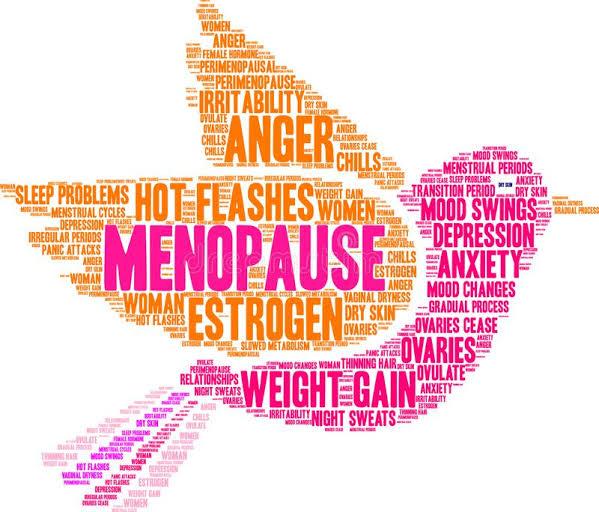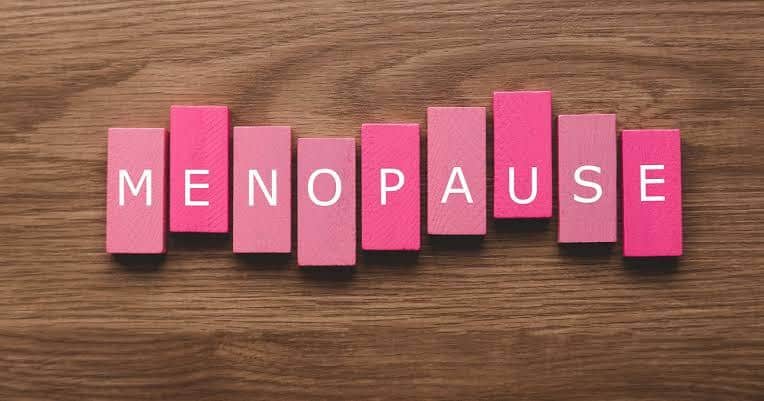Menopause is defined as having no periods for one year or more. Women in their lifetime, experience menopause either at an early age or typically occurs in their late 40s or 50s, it can vary on the age.
Menopause is a condition of decreased production of estrogen and progesterone in your ovaries and is followed up by many symptoms in the body.
Changes in your body while going through menopause may raise your risk for certain health problems.
The menstrual cycle plays a vital role in a woman’s life. Women are born with all of their eggs stored in their ovaries which are required at the age when planning to reproduce. Their ovaries also make two important hormones called estrogen and progesterone, which control their menstruation and the release of eggs ovulation. Menopause happens when the ovaries no longer release an egg every month and the menstruation cycle stops.
A. What are the symptoms of menopause?

The symptoms can be noticed before menstruation ends, and they can exist for several years when not treated. Menopause can also impact a person’s quality of life and can range from mild to severe. However, there are many ways of treating these symptoms.
Each person can experience menopause differently depending on the type of body, age, eating habits, and living habits.
During menopause, various physical and mental changes can occur, causing symptoms.
Some of these symptoms start before menopause, and some can be faced after it:
Irregular or no menstruation
The first and foremost sign of menopause is the change in the menstrual cycle (occurring less regularly). As ovulation becomes more unpredictable, the duration between periods may be increased or decreased, the flow may be lighter to heavier, or there can be a gap between your menstrual cycles.
If there is a constant change in your menstrual cycle (60 days or more) you are in the
premenopause phase.
Vaginal and bladder-related problems
When estrogen level declines during menopause, vaginal tissues start losing their lubrication and elasticity, making intercourse painful. Insufficient estrogen may also leave you more feeble in getting urinary tract or vaginal infections. Losing of tissue tone may turn out into urinary incontinence.
- Decrease in fertility
When the menstrual cycle is affected ovulation becomes irregular, and the body’s ability to conceive decreases.
- Hot flashes and sleep problems
Hot flashes and sleep deprivation are common symptoms during menopause. They cause a sudden sensation of heat in the person’s upper body and progress downward during the night.
Hot flashes can also cause sweating(red patches formed on the skin. It usually occurs in the first year after menstruation stops, and can proceed up to 14 years after menopause.
- Emotional changes and mood swings

The common symptoms of menopause are:-
i) Depression
ii) anxiety
iii) low mood
Hormonal changes and sleep disturbances can contribute to these mental issues. Also, stress related to low libido or the end of fertility can bring down a person’s mental health causing depression during menopause.
- Other symptoms
A person may also experience other symptoms such as a buildup of fat around the abdomen, weight gain, changes in hair color, texture, volume, and breast reduction.
B. Treat menopause through these easy and simple changes in your lifestyle
Through research and study, it has been found that menopausal people have higher chances of several diseases like osteoporosis, obesity, breast cancer, heart disease, and diabetes. Menopause is not a disease it is a lifestyle disorder. It can involve unwanted physical and mental effects on a person’s health. There are various medications and therapies to treat menopause but some lifestyle changes can also help in treating menopause.
- Maintaining a healthy weight

It is a common symptom to gain weight during menopause. Due to a combination of changes in hormones, aging, lifestyle, and genetics. People should focus on maintaining a healthy weight that depends upon various factors rather than worrying about menopause. Maintaining healthy can also reduce many health diseases and enhances lifestyle.
- Intake balanced diet
Hormonal changes during menopause can cause bone health to deplete, increasing the risk of osteoporosis(a condition in which bones become brittle and fragile due to loss of tissue). So, try adding foods to your diet that are rich in calcium and vitamin D.
vegetables such as spinach, and broccoli are greeny and leafy which are rich in calcium.
good sources of calcium-rich food include certain cereals, fruit juice dairy products like yogurt, milk, and cheese.
Sunlight is the main source of vitamin D which helps the body to produce Vit D
Rich dietary sources include oily fish, eggs, cod liver oil, and foods fortified with vitamin D.Sufficient vitamin D infusion during postmenopause lowers the risk of hip fractures from weak bones.
- Avoid trigger foods
Certain foods such as caffeine, alcohol, and foods that are sugary or spicy may trigger hot flashes, night sweats, and mood changes.
They may be even more likely to be triggered when eaten at night.so, try avoiding them, especially before going to sleep.
4. Exercise regularly
Regular exercise improves overall health and protects against diseases and conditions such as cancer, heart disease, stroke, high blood pressure, type 2 diabetes, obesity, and osteoporosis. Menopausal people should perform regular exercises and activities that engage whole body muscles.
5. Decrease intake of refined sugar and processed foods
Diets high in processed foods and refined carbs are associated with a higher risk of depression and worse bone health in postmenopausal people.
Also Read: All About Amla (Indian Gooseberry) & its Benefits













